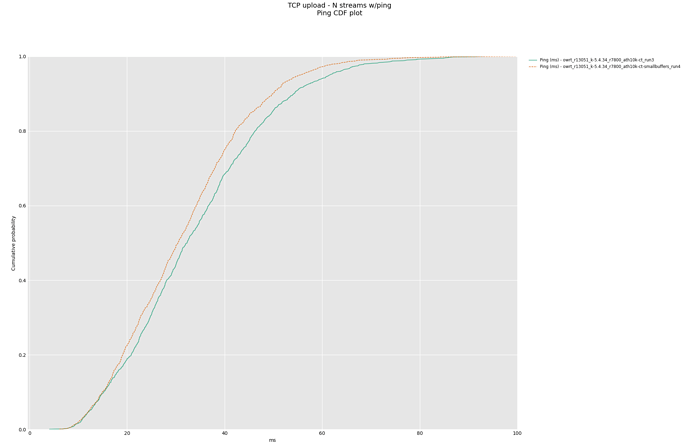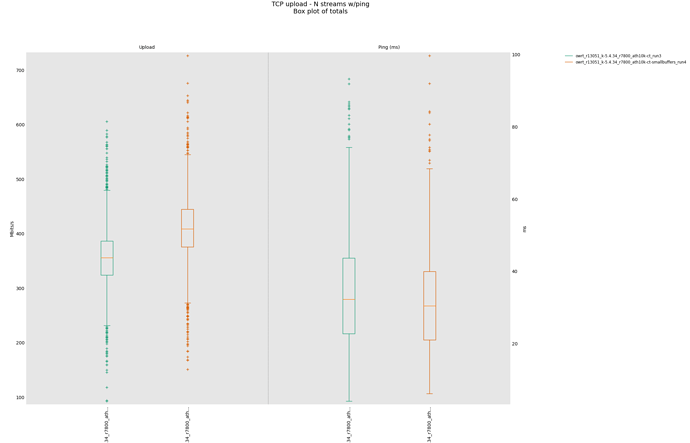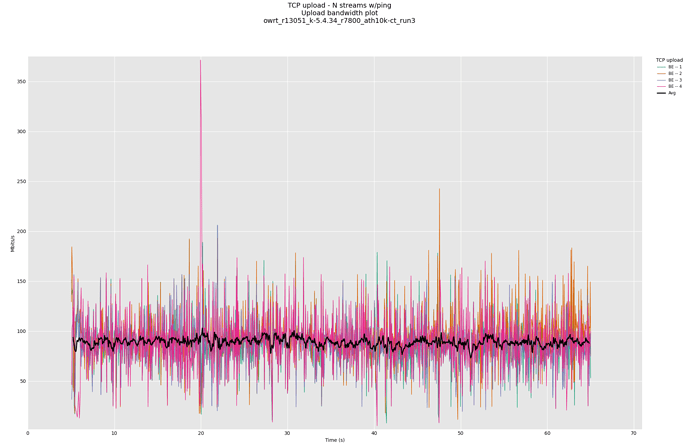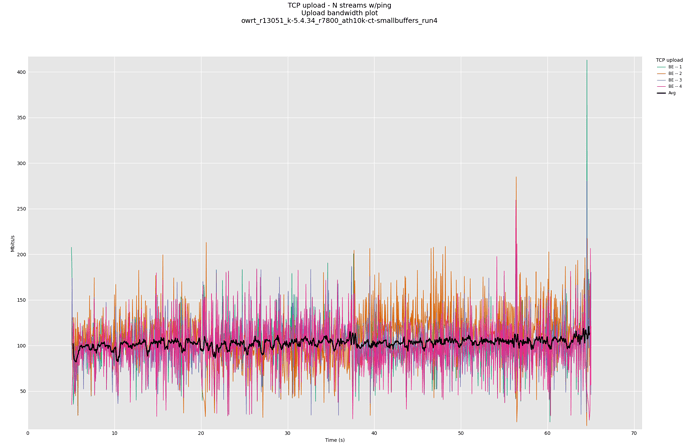:bated breath:
` Here are the eye-popping results of the tests, only minutes
old. The only difference between these tests is the OpenWRT
build.
Bravo. ``` I can scarcely grasp the enormity of this
accomplishment, Dave. Indeed, I can hardly even believe these
results, but there they are. Sometimes a great notion, eh?
Steve
` ## BEFORE AQL, build r12234-7d7aa2fd92, ath10k (not
ath10k-ct) ##
200416 21:27 /persist/home/srn root@nutkin# flent rrul -H rpc160
Started Flent 1.2.2 using Python 3.7.3.
Starting rrul test. Expected run time: 70 seconds.
Data file written to ./rrul-2020-04-16T212920.834707.flent.gz.
Summary of rrul test run at 2020-04-17 01:29:20.834707:
avg median # data pts
Ping (ms) ICMP : 3266.06 2255.00 ms 195
Ping (ms) UDP BE : 104.00 3.05 ms 83
Ping (ms) UDP BK : 78.56 2.88 ms 68
Ping (ms) UDP EF : 48.77 69.40 ms 267
Ping (ms) avg : 874.35 1128.27 ms 348
TCP download BE : 0.58 0.47 Mbits/s 126
TCP download BK : 0.08 0.04 Mbits/s 59
TCP download CS5 : 19.31 19.29 Mbits/s 291
TCP download EF : 20.78 20.52 Mbits/s 290
TCP download avg : 10.19 12.62 Mbits/s 300
TCP download sum : 40.75 41.03 Mbits/s 300
TCP totals : 55.13 55.15 Mbits/s 302
TCP upload BE : 0.03 0.20 Mbits/s 2
TCP upload BK : 0.01 0.07 Mbits/s 1
TCP upload CS5 : 6.14 4.62 Mbits/s 142
TCP upload EF : 8.20 8.39 Mbits/s 144
TCP upload avg : 3.59 7.23 Mbits/s 301
TCP upload sum : 14.38 14.52 Mbits/s 301
200416 21:31 /persist/home/srn root@nutkin# flent rrul_be -H
rpc160
Started Flent 1.2.2 using Python 3.7.3.
Starting rrul_be test. Expected run time: 70 seconds.
Data file written to ./rrul_be-2020-04-16T213145.337942.flent.gz.
Summary of rrul_be test run at 2020-04-17 01:31:45.337942:
avg median # data pts
Ping (ms) ICMP : 380.24 409.00 ms 290
Ping (ms) UDP BE1 : 47.59 198.41 ms 127
Ping (ms) UDP BE2 : 48.16 166.94 ms 121
Ping (ms) UDP BE3 : 47.44 105.24 ms 110
Ping (ms) avg : 130.86 414.18 ms 351
TCP download BE : 11.56 9.64 Mbits/s 179
TCP download BE2 : 11.54 10.54 Mbits/s 132
TCP download BE3 : 9.07 7.50 Mbits/s 155
TCP download BE4 : 12.85 13.30 Mbits/s 146
TCP download avg : 11.25 11.75 Mbits/s 301
TCP download sum : 45.02 45.53 Mbits/s 301
TCP totals : 45.35 45.52 Mbits/s 302
TCP upload BE : 0.07 0.08 Mbits/s 15
TCP upload BE2 : 0.09 0.12 Mbits/s 12
TCP upload BE3 : 0.09 0.11 Mbits/s 16
TCP upload BE4 : 0.08 0.10 Mbits/s 16
TCP upload avg : 0.08 0.07 Mbits/s 149
TCP upload sum : 0.33 0.09 Mbits/s 149
## AFTER AQL, build r12991-75ef28be59, ath10k (not ath10k-ct) ##
200417 12:08 /persist/home/srn root@nutkin# flent rrul -H rpc160
Started Flent 1.2.2 using Python 3.7.3.
Starting rrul test. Expected run time: 70 seconds.
Data file written to ./rrul-2020-04-17T120940.630122.flent.gz.
Summary of rrul test run at 2020-04-17 16:09:40.630122:
avg median # data pts
Ping (ms) ICMP : 44.11 43.90 ms 349
Ping (ms) UDP BE : 77.41 47.48 ms 300
Ping (ms) UDP BK : 77.40 50.03 ms 303
Ping (ms) UDP EF : 78.21 50.40 ms 308
Ping (ms) avg : 69.28 50.64 ms 351
TCP download BE : 8.64 7.46 Mbits/s 248
TCP download BK : 9.02 7.60 Mbits/s 251
TCP download CS5 : 9.04 7.54 Mbits/s 252
TCP download EF : 8.78 7.60 Mbits/s 245
TCP download avg : 8.87 8.17 Mbits/s 301
TCP download sum : 35.48 32.68 Mbits/s 301
TCP totals : 104.89 107.37 Mbits/s 305
TCP upload BE : 17.28 17.34 Mbits/s 185
TCP upload BK : 17.21 17.06 Mbits/s 188
TCP upload CS5 : 16.27 17.58 Mbits/s 182
TCP upload EF : 18.65 19.35 Mbits/s 189
TCP upload avg : 17.35 18.17 Mbits/s 302
TCP upload sum : 69.41 72.58 Mbits/s 302
200417 12:10 /persist/home/srn root@nutkin# flent rrul_be -H
rpc160
Started Flent 1.2.2 using Python 3.7.3.
Starting rrul_be test. Expected run time: 70 seconds.
Data file written to ./rrul_be-2020-04-17T121114.896308.flent.gz.
Summary of rrul_be test run at 2020-04-17 16:11:14.896308:
avg median # data pts
Ping (ms) ICMP : 41.30 43.10 ms 349
Ping (ms) UDP BE1 : 79.81 44.68 ms 313
Ping (ms) UDP BE2 : 80.77 45.60 ms 311
Ping (ms) UDP BE3 : 80.31 44.51 ms 312
Ping (ms) avg : 70.55 47.27 ms 351
TCP download BE : 9.28 8.06 Mbits/s 257
TCP download BE2 : 10.23 8.23 Mbits/s 261
TCP download BE3 : 9.68 8.13 Mbits/s 258
TCP download BE4 : 9.09 8.40 Mbits/s 257
TCP download avg : 9.57 8.60 Mbits/s 301
TCP download sum : 38.28 34.39 Mbits/s 301
TCP totals : 108.46 109.56 Mbits/s 304
TCP upload BE : 16.81 16.41 Mbits/s 185
TCP upload BE2 : 16.39 17.21 Mbits/s 185
TCP upload BE3 : 19.92 21.25 Mbits/s 183
TCP upload BE4 : 17.06 16.73 Mbits/s 191
TCP upload avg : 17.55 18.55 Mbits/s 301
TCP upload sum : 70.18 74.17 Mbits/s 301
`I would be as happy as you are, if I wasn't painfully aware of the 100s of millions of wifi APs shipped in the last 4 years that behave as per your "before" result. And I think it's still possible to do a great deal better on the _be test, but honestly I don't know enough about batman's encapsulation to tell.
could you slam the associated *.flent.gz files up somewhere?
For this test:
flent -H the_server_ip --step-size=.04 --socket-stats --te=upload_streams=16 tcp_nup
If you can get a packet cap of the "after" result (from the server) I'd love to see that. (tcpdump -i whatever_the_device_is -s 140 -n -w tcp_nup.cap) (note if you run the capture on the ap it will slow it down by a lot and heisenbug the result, better to be on the ultimate target)
` Alas, I have to declare the test we are celebrating very
flawed. I ran the "before AQL" test via my notebook's wifi
interface but the "after AQL" test via wire.
I discovered this by looking at the *.flent.gz files. (Which are
available now at rosepark dot us slash flentDotGzs1.tar)
To even things up, here are the much more comparable (and
believable by comparison, at least) results I get by using the
wifi interface again with the post-AQL build. I must go back,
sigh, and reload the old build and run the pre-AQL test by wire.
Science means apples to apples, among other things.
200417 12:12 /persist/home/srn root@nutkin# flent rrul -H rpc160
Started Flent 1.2.2 using Python 3.7.3.
Starting rrul test. Expected run time: 70 seconds.
Data file written to ./rrul-2020-04-17T131955.475716.flent.gz.
Summary of rrul test run at 2020-04-17 17:19:55.475716:
avg median # data pts
Ping (ms) ICMP : 2803.39 2622.00 ms 226
Ping (ms) UDP BE : 99.09 16.87 ms 93
Ping (ms) UDP BK : 85.10 2.73 ms 69
Ping (ms) UDP EF : 45.00 74.43 ms 270
Ping (ms) avg : 758.15 1239.33 ms 351
TCP download BE : 0.81 0.64 Mbits/s 138
TCP download BK : 0.07 0.04 Mbits/s 63
TCP download CS5 : 18.90 18.67 Mbits/s 286
TCP download EF : 19.11 18.99 Mbits/s 287
TCP download avg : 9.72 11.63 Mbits/s 301
TCP download sum : 38.89 38.82 Mbits/s 301
TCP totals : 53.73 53.94 Mbits/s 304
TCP upload BE : 0.02 0.46 Mbits/s 1
TCP upload BK : 0.01 0.03 Mbits/s 1
TCP upload CS5 : 8.30 8.96 Mbits/s 156
TCP upload EF : 6.51 6.63 Mbits/s 162
TCP upload avg : 3.71 7.49 Mbits/s 302
TCP upload sum : 14.84 14.96 Mbits/s 302
200417 13:21 /persist/home/srn root@nutkin# flent rrul_be -H
rpc160
Started Flent 1.2.2 using Python 3.7.3.
Starting rrul_be test. Expected run time: 70 seconds.
Data file written to ./rrul_be-2020-04-17T132127.818583.flent.gz.
Summary of rrul_be test run at 2020-04-17 17:21:27.818583:
avg median # data pts
Ping (ms) ICMP : 376.73 429.00 ms 283
Ping (ms) UDP BE1 : 41.21 212.31 ms 107
Ping (ms) UDP BE2 : 51.99 131.07 ms 116
Ping (ms) UDP BE3 : 50.60 209.64 ms 117
Ping (ms) avg : 130.13 434.71 ms 351
TCP download BE : 9.58 8.58 Mbits/s 136
TCP download BE2 : 14.19 12.68 Mbits/s 162
TCP download BE3 : 11.76 11.59 Mbits/s 197
TCP download BE4 : 11.15 10.20 Mbits/s 183
TCP download avg : 11.67 12.31 Mbits/s 301
TCP download sum : 46.68 44.44 Mbits/s 301
TCP totals : 47.01 44.24 Mbits/s 303
TCP upload BE : 0.08 0.08 Mbits/s 16
TCP upload BE2 : 0.08 0.08 Mbits/s 17
TCP upload BE3 : 0.09 0.11 Mbits/s 14
TCP upload BE4 : 0.08 0.12 Mbits/s 12
TCP upload avg : 0.08 0.07 Mbits/s 146
TCP upload sum : 0.33 0.09 Mbits/s 146
200417 13:22 /persist/home/srn root@nutkin#` Using the wired interface of my notebook for both the
before-AQL and after-AQL flent tests seems to indicate that
after-AQL is actually not such a big advantage, if indeed any
advantage at all.
I was hopeful; now I don't know what to think.
Steve
## BEFORE AQL, build r12234-7d7aa2fd92, ath10k (not ath10k-ct) ##
200417 14:54 /tmp root@nutkin# flent rrul -H rpc160
Started Flent 1.2.2 using Python 3.7.3.
Starting rrul test. Expected run time: 70 seconds.
Data file written to ./rrul-2020-04-17T145454.743300.flent.gz.
Summary of rrul test run at 2020-04-17 18:54:54.743300:
avg median # data pts
Ping (ms) ICMP : 27.22 26.70 ms 349
Ping (ms) UDP BE : 83.97 33.42 ms 309
Ping (ms) UDP BK : 84.61 31.98 ms 311
Ping (ms) UDP EF : 83.56 31.41 ms 311
Ping (ms) avg : 69.84 34.18 ms 351
TCP download BE : 7.84 6.72 Mbits/s 248
TCP download BK : 8.01 6.88 Mbits/s 245
TCP download CS5 : 8.31 6.72 Mbits/s 248
TCP download EF : 8.49 7.19 Mbits/s 245
TCP download avg : 8.16 7.39 Mbits/s 301
TCP download sum : 32.65 29.46 Mbits/s 301
TCP totals : 116.70 118.72 Mbits/s 305
TCP upload BE : 19.85 20.44 Mbits/s 175
TCP upload BK : 22.81 22.92 Mbits/s 195
TCP upload CS5 : 19.86 19.43 Mbits/s 207
TCP upload EF : 21.53 22.10 Mbits/s 194
TCP upload avg : 21.01 21.96 Mbits/s 302
TCP upload sum : 84.05 87.71 Mbits/s 302
200417 14:56 /tmp root@nutkin# flent rrul_be -H rpc160
Started Flent 1.2.2 using Python 3.7.3.
Starting rrul_be test. Expected run time: 70 seconds.
Data file written to ./rrul_be-2020-04-17T145629.817434.flent.gz.
Summary of rrul_be test run at 2020-04-17 18:56:29.817434:
avg median # data pts
Ping (ms) ICMP : 24.44 25.10 ms 349
Ping (ms) UDP BE1 : 87.96 30.52 ms 316
Ping (ms) UDP BE2 : 88.17 30.55 ms 313
Ping (ms) UDP BE3 : 87.99 30.22 ms 315
Ping (ms) avg : 72.14 31.99 ms 351
TCP download BE : 7.56 6.70 Mbits/s 243
TCP download BE2 : 7.69 6.74 Mbits/s 244
TCP download BE3 : 7.54 6.48 Mbits/s 236
TCP download BE4 : 7.75 6.73 Mbits/s 241
TCP download avg : 7.63 7.37 Mbits/s 301
TCP download sum : 30.54 29.47 Mbits/s 301
TCP totals : 116.69 118.76 Mbits/s 304
TCP upload BE : 24.79 23.37 Mbits/s 196
TCP upload BE2 : 20.23 21.01 Mbits/s 206
TCP upload BE3 : 19.05 20.34 Mbits/s 203
TCP upload BE4 : 22.08 22.47 Mbits/s 217
TCP upload avg : 21.54 22.17 Mbits/s 301
TCP upload sum : 86.15 88.59 Mbits/s 301
## AFTER AQL, build r12991-75ef28be59, ath10k (not ath10k-ct) ##
200417 12:08 /persist/home/srn root@nutkin# flent rrul -H rpc160
Started Flent 1.2.2 using Python 3.7.3.
Starting rrul test. Expected run time: 70 seconds.
Data file written to ./rrul-2020-04-17T120940.630122.flent.gz.
Summary of rrul test run at 2020-04-17 16:09:40.630122:
avg median # data pts
Ping (ms) ICMP : 44.11 43.90 ms 349
Ping (ms) UDP BE : 77.41 47.48 ms 300
Ping (ms) UDP BK : 77.40 50.03 ms 303
Ping (ms) UDP EF : 78.21 50.40 ms 308
Ping (ms) avg : 69.28 50.64 ms 351
TCP download BE : 8.64 7.46 Mbits/s 248
TCP download BK : 9.02 7.60 Mbits/s 251
TCP download CS5 : 9.04 7.54 Mbits/s 252
TCP download EF : 8.78 7.60 Mbits/s 245
TCP download avg : 8.87 8.17 Mbits/s 301
TCP download sum : 35.48 32.68 Mbits/s 301
TCP totals : 104.89 107.37 Mbits/s 305
TCP upload BE : 17.28 17.34 Mbits/s 185
TCP upload BK : 17.21 17.06 Mbits/s 188
TCP upload CS5 : 16.27 17.58 Mbits/s 182
TCP upload EF : 18.65 19.35 Mbits/s 189
TCP upload avg : 17.35 18.17 Mbits/s 302
TCP upload sum : 69.41 72.58 Mbits/s 302
200417 12:10 /persist/home/srn root@nutkin# flent rrul_be -H
rpc160
Started Flent 1.2.2 using Python 3.7.3.
Starting rrul_be test. Expected run time: 70 seconds.
Data file written to ./rrul_be-2020-04-17T121114.896308.flent.gz.
Summary of rrul_be test run at 2020-04-17 16:11:14.896308:
avg median # data pts
Ping (ms) ICMP : 41.30 43.10 ms 349
Ping (ms) UDP BE1 : 79.81 44.68 ms 313
Ping (ms) UDP BE2 : 80.77 45.60 ms 311
Ping (ms) UDP BE3 : 80.31 44.51 ms 312
Ping (ms) avg : 70.55 47.27 ms 351
TCP download BE : 9.28 8.06 Mbits/s 257
TCP download BE2 : 10.23 8.23 Mbits/s 261
TCP download BE3 : 9.68 8.13 Mbits/s 258
TCP download BE4 : 9.09 8.40 Mbits/s 257
TCP download avg : 9.57 8.60 Mbits/s 301
TCP download sum : 38.28 34.39 Mbits/s 301
TCP totals : 108.46 109.56 Mbits/s 304
TCP upload BE : 16.81 16.41 Mbits/s 185
TCP upload BE2 : 16.39 17.21 Mbits/s 185
TCP upload BE3 : 19.92 21.25 Mbits/s 183
TCP upload BE4 : 17.06 16.73 Mbits/s 191
TCP upload avg : 17.55 18.55 Mbits/s 301
TCP upload sum : 70.18 74.17 Mbits/s 301
`I don't know what to think either. What is your topology?
laptop - wifi AP - wifi AP - server was the basic structure of the test. Certainly going wifi to the wifi ap will drive it harder to distraction - it is multiplexing more than one wifi client that really messes up wifi.
Looking over your two tarballs, really, the result you had there is about what I expected from aql - about 40-60ms of latency on the rrul test () and from what I expected pre-aql (2-3 sec).
what is the laptop's wifi chip?
what is the laptop's wifi chip?
From lshw:
*-network
description: Wireless interface
product: Centrino Advanced-N 6205 [Taylor Peak]
vendor: Intel Corporation
physical id: 0
bus info: pci@0000:03:00.0
logical name: wlp3s0
version: 34
serial: 8c:70:5a:f8:c8:14
width: 64 bits
clock: 33MHz
capabilities: pm msi pciexpress bus_master cap_list ethernet physical wireless
configuration: broadcast=yes driver=iwlwifi driverversion=4.19.0-8-amd64 firmware=18.168.6.1 ip=192.168.159.190 latency=0 link=yes multicast=yes wireless=IEEE 802.11
resources: irq:36 memory:f2500000-f2501fff
...but I was trying to limit the wifi exposure of the test to just the radios involved in batman-adv, so I tried to get that chip out of the circuit.
so it was laptop - gige ethernet - batman - batman - gige ethernet - server where you could discern no difference?
Looks to me like you've got an extra Gbit ethernet in your chain
above. I would characterize it as:
laptop - 1Gbit ethernet - batmanrouter (- 5GHz radio -) batmanrouter
with netserver running right on the second batmanrouter. But maybe
that's a distinction without a difference. Dave, I dunno how to
read these tests, really. I'm just guessing. But the performance
with the new build seemed (trivially) worse, as opposed to (much)
better. The problem I'm having in the field is with VOIP, which I gather is
very sensitive to bufferbloat. That chain looks like this:
(internet actually around 120Mbit but claimed to be 1Gbit, ha ha) -
batman (- 5Ghz radio -) batman - 100Mbit ethernet - VOIP box -
analog wiring - telephone. Since no wifi is involved in that chain, other than the batman
radio, I was particularly interested in factoring out all other wifi
from the test. The tests make me think maybe the new build isn't
going to help me with the VOIP drop-out issue. The same VOIP
arrangement with the same vendors (Obihai, Google Voice) works
essentially perfectly when the chain is:
(internet actually around 120Mbit but claimed to be 1Gbit, ha ha) -
1Gbit router (irrelevantly running batman) - VOIP box - analog
wiring - telephone. (Right now I'm trying to work out a safe way to upgrade all 10 mesh
routers without having to invade universally-quarantined homes here
in New York. If I break the mesh, I will lose the access required
to fix it. Still, I'd rather endure this safety-programming
headache than to spread or contract the virus.)
@dtaht I have been following your research and efforts for some time and I am in awe of the improvements you've introduced in the WiFi world. Thank you so much for continuing to develop and innovate!
I am the happy owner of a Netgear R7800 router--IMHO one of the finest out there. That said, I have moved my routing/firewall over to a pfSense box for reasons that do not center around the R7800's performance capabilities. But, I still use my R7800 entirely as an AP at this point.
I have been running @hnyman's snapshot builds and have been blown away by the low WiFi latency with the 5.4 kernel and new ath10k-ct driver. Astonishing difference, really.
Now to my question for you, given the R7800 has 512MB RAM, is there any advantage to be gained still by using the kmod-ath10k-ct-smallbuffers module? Does it in any way introduce further latency improvements due to smaller buffers even on devices that are not otherwise RAM bound?
More public benchmarks between the two versions are good.  I'm happy to hear the 7800 is working well. I have one in my junk bin somewhere.
I'm happy to hear the 7800 is working well. I have one in my junk bin somewhere.
I'm weird, I go for low latency and I care not at all about peak throughput on a lab bench. (what kind of throughput are you getting?) Having less buffering always means less latency.
My big test at the moment is that I'm trying to get the codel target down to sanity for tcp for the ath10k, and jiggle AQL, so what I've been doing is running tests like this:
flent -H the_server_box --socket-stats --te=upload_streams=4 --step-size=.04 -t 'whatever_is_under_test' tcp_nup
And... running out of cpu on the low end uap mesh routers I'm using at 300+Mbit with VHT80. Assuming this patchset works out would love to see @hnyman give 'em a shot.
running netperf on the router itself will generally A) invoke TSQ and automatically rate limit and B) run you out of cpu. You can beat A) by running more flows (16 or more) but that means you hit B) sooner.
A valid test is of the customer environment - a real client (or set thereof) and real server(s).
oh, good, the QCA9984 is the firmware in the netgear. QCA9988 is what I have tested. We had so many issues with the darn firmware that I'd given up on the ath10k entirely, so many chipset variants... I'm glad so many have perservered in fixing so many other bugs, here (huge hat tip to ben greer) and I go back to asking what kind of throughput you are getting out of it....
Thanks for the quick reply! If you ever dig your R7800 out of your junk pile and need to find it a new home, let me know... 
I'm in the process of building a stripped down build from the latest snapshot that will be bare-bones for my AP needs. I'll build for ath10k-ct and a separate build for ath10k-ct-smallbuffers and do some benchmarking with flent tomorrow AM. What a fantastic tool it is!
Looking forward to seeing the results in the morning and sharing with you.
I forgot a key param to flent above. Also add --socket-stats to gather tcp info. should be a nice day tomorrow.
Oops again. Testing is a can of worms. I'll do this over again ASAP, but not as soon as I'd like.
I have some results from both ath10k-ct and ath10k-ct-smallbuffers tests. What is the best way to get them to you?
R7800 ath10k-ct:
R7800 ath10k-ct-smallbuffers:
hahaha, you are showing smallbuffers works mildly better but not so much better that it could just merely be noise in the two test results.
If you can tar up the flent.gz files and send those to dave dot taht at gmail dot come I'd appreciate it.
If you have some captures, that's too big for email, dropbox? scp to some site you control? I can give you an account on a bufferbloat.net server if you like, give me a desired login and ssh key.....
f you feel like patching yer openwrt kernel, you can patch the mac80211 backports in openwrt to reduce the codel target. Please note this is still the wrong patch for 2.4ghz, but... my guess is you'll see quite a reduction in tcp rtt at no cost in throughput (For this particular test). put http://www.taht.net/~d/982-do-codel-right.patch into package/kernel/mac80211/patches/ath/982-do-codel-right.patch which I think is the right thing and right place.
diff --git a/net/mac80211/sta_info.c b/net/mac80211/sta_info.c
index c431722..92ba09b 100644
--- a/net/mac80211/sta_info.c
+++ b/net/mac80211/sta_info.c
@@ -476,10 +476,11 @@ struct sta_info *sta_info_alloc(struct ieee80211_sub_if_data *sdata,
sta->sta.max_rc_amsdu_len = IEEE80211_MAX_MPDU_LEN_HT_BA;
sta->cparams.ce_threshold = CODEL_DISABLED_THRESHOLD;
- sta->cparams.target = MS2TIME(20);
+ sta->cparams.target = MS2TIME(5);
sta->cparams.interval = MS2TIME(100);
sta->cparams.ecn = true;
-
+ sta_dbg(sdata, "Codel target, interval %d, %d\n", sta->cparams.target,
+ sta->cparams.interval);
sta_dbg(sdata, "Allocated STA %pM\n", sta->sta.addr);
return sta;
@@ -2468,15 +2469,9 @@ static void sta_update_codel_params(struct sta_info *sta, u32 thr)
if (!sta->sdata->local->ops->wake_tx_queue)
return;
- if (thr && thr < STA_SLOW_THRESHOLD * sta->local->num_sta) {
- sta->cparams.target = MS2TIME(50);
- sta->cparams.interval = MS2TIME(300);
- sta->cparams.ecn = false;
- } else {
- sta->cparams.target = MS2TIME(20);
- sta->cparams.interval = MS2TIME(100);
- sta->cparams.ecn = true;
- }
+ sta->cparams.target = MS2TIME(5);
+ sta->cparams.interval = MS2TIME(100);
+ sta->cparams.ecn = true;
}
diff --git a/net/mac80211/tx.c b/net/mac80211/tx.c
index 535911b..ca50d0a 100644
--- a/net/mac80211/tx.c
+++ b/net/mac80211/tx.c
@@ -1551,7 +1551,7 @@ int ieee80211_txq_setup_flows(struct ieee80211_local *local)
codel_params_init(&local->cparams);
local->cparams.interval = MS2TIME(100);
- local->cparams.target = MS2TIME(20);
+ local->cparams.target = MS2TIME(5);
local->cparams.ecn = true;
local->cvars = kcalloc(fq->flows_cnt, sizeof(local->cvars[0]),



